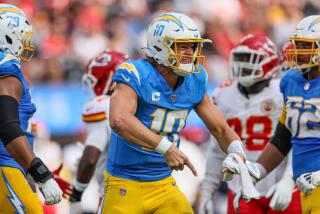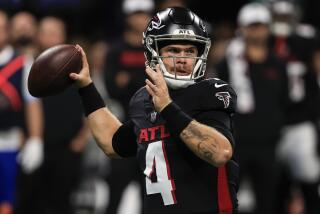Chargers Let Falcons Go First
- Share via
The San Diego Chargers risked being trapped by their own words Friday, trading the No. 1 pick in today’s NFL draft to the Atlanta Falcons after failing to reach a pre-draft contract agreement with Virginia Tech quarterback Michael Vick.
The Chargers’ mantra has been that that they don’t want to become the Portland Trail Blazers of the NFL--a reference to the Trail Blazers passing on Michael Jordan to select Sam Bowie in the 1984 NBA draft.
Now only time will tell.
The Chargers--perhaps still feeling burned by the error they made on Ryan Leaf--traded the pick for Atlanta’s first-round choice at No. 5 as well as the Falcons’ third-round pick today, the Falcons’ second-round pick in 2002 and wide receiver Tim Dwight.
Instead of Vick, a potential star who would have sat for a season or more behind Doug Flutie, the Chargers could end up with LaDainian Tomlinson of Texas Christian, a 5-foot-10, 222-pound running back who led the nation in rushing the last two seasons.
Unlike Vick, Tomlinson could help the Chargers recover immediately from last season’s 1-15 record by boosting the NFL’s worst running game.
Rookie running backs have had considerable success in recent years--among them Edgerrin James of the Indianapolis Colts in 1999 and Mike Anderson of the Denver Broncos and Jamal Lewis of the Baltimore Ravens last season.
“What I care about is winning, and winning right now,” Charger General Manager John Butler said. “And any way we can get the help to do it, that’s the way I’m going to look.”
Atlanta needs an heir to aging and battered quarterback Chris Chandler.
Falcon Coach Dan Reeves said Atlanta will select Vick. “He’s a great football player, but he’s an exceptional young man who I think will set this franchise up for a long time to come.”
Vick called the trade “shocking.” “I still have to talk to my agent to find out what really went down, why the Chargers came to the decision,” he said.
The Arizona Cardinals hold the second pick, and barring a trade would take Florida defensive tackle Gerard Warren or perhaps Texas offensive tackle Leonard Davis. The Cleveland Browns, also interested in trading down, are expected to use the third pick on Michigan’s David Terrell, the best of a strong receiving crop. The Cincinnati Bengals are poised to take Davis fourth if he’s available, potentially leaving Tomlinson available at No. 5.
Mississippi’s Deuce McAllister is expected to be the second running back taken, but the Chargers also could decide to fill another need at offensive line, with Florida’s Kenyatta Walker and Michigan’s Steve Hutchinson rated behind Davis.
“You know what, we will get a very good player with that fifth pick,” Coach Mike Riley said. “There are three guys in mind.
“Whether the running back is picked first or later, we’re going to get both of those positions filled in the first three picks.”
San Diego conceivably could trade down yet again--and another running back, Wisconsin’s Michael Bennett, is considered a late first-round or early second-round pick. For the Chargers, any fear of repeating the Trail Blazers’ error might have been exceeded only by the fear of repeating the blunder they made by drafting Leaf with the second pick in 1998.
The Chargers gave Leaf a signing bonus of $11.25 million and were still paying for it when they released him in March, ending a disastrous saga marked by boorish behavior and a mere 13 touchdown passes compared with 33 interceptions.
Vick’s agents were said to be seeking a large signing bonus--though a source said reports of $15 million were unfounded--and an overall contract worthy of a No. 1 pick even though he might not start his first or second season. The Chargers didn’t want to risk a contract structure that would require paying so much with no assurance of a return, as they did with Leaf.
“I can’t say it wasn’t in somebody’s mind, or that, ‘Gosh, we don’t want to go down that road again,’ but it was never brought up,” Riley said.
Club President Dean Spanos had insisted in recent days he wasn’t bluffing about not taking Vick if the sides couldn’t reach a pre-draft contract agreement as Cleveland did with each of the last two No. 1 picks. That much proved true.
But the real bluff might have been the Chargers’ adoring commitment to Vick, who left school after his sophomore season.
The compliments Butler and Riley paid Vick were so unfailing--Butler said during Vick’s visit to San Diego that the quarterback could only dissuade the Chargers by “cutting in front of the chow line”--that they might have been part of a concerted effort to boost the pick’s trade value.
If that was the goal all along--securing as much immediate help as possible for a talent-starved team--the Chargers might have wished for more. (The Seattle Seahawks, who needed a quarterback before acquiring Matt Hasselbeck from the Green Bay Packers, have two first-round picks.)
One puzzling aspect of the situation was the urgency of a pre-draft contract agreement.
Though Cleveland has made it a recent habit, agent Leigh Steinberg--who has represented No. 1 draft picks who signed early as well as some who didn’t--called the emphasis of a pre-draft deal “artificial.”
“There is no immutable rule or precedent that a player needs to sign prior,” Steinberg said. “The team has his draft rights anyway. His only alternative is to sit out a year. It’s not as if he’d go back to Virginia Tech and develop a new theory of super-collider research or play cello in the Blacksburg orchestra.”
Because Vick wasn’t expected to play much in his first season anyway, the leverage shifted even more heavily toward the Chargers.
Perhaps the answer rests in the questions about Vick, who played only two seasons of college football.
Though he has a strong arm, quick release and abundantly obvious running ability, it’s unreasonable to anoint him the next Jordan or Tiger Woods.
Some question his accuracy, his size, his durability.
If the Chargers did too, they aren’t saying.
“As far as Michael Vick was concerned, how quick would he have played? How much could he have helped us quickly? We don’t know,” Butler said. “We can’t look in a crystal ball.”
(BEGIN TEXT OF INFOBOX / INFOGRAPHIC)
FIRST ROUND
1. Atlanta
2. Arizona
3. Cleveland
4. Cincinnati
5. San Diego
6. New England
7. Seattle
8. Chicago
9. San Francisco
10. Green Bay
11. Carolina
12. St. Louis
13. Jacksonville
14. Buffalo
15. Washington
16. Pittsburgh
17. Seattle
18. Detroit
19. N.Y. Jets
20. St. Louis
21. Tampa Bay
22. Indianapolis
23. New Orleans
24. Denver
25. Philadelphia
26. Miami
27. Minnesota
28. Oakland
29. St. Louis
30. N.Y. Giants
31. Baltimore
*
INSIDE
* UCLA’s Freddie Mitchell likes his chances. D4
* The Chiefs trade their first pick for Trent Green. D4
More to Read
Go beyond the scoreboard
Get the latest on L.A.'s teams in the daily Sports Report newsletter.
You may occasionally receive promotional content from the Los Angeles Times.










